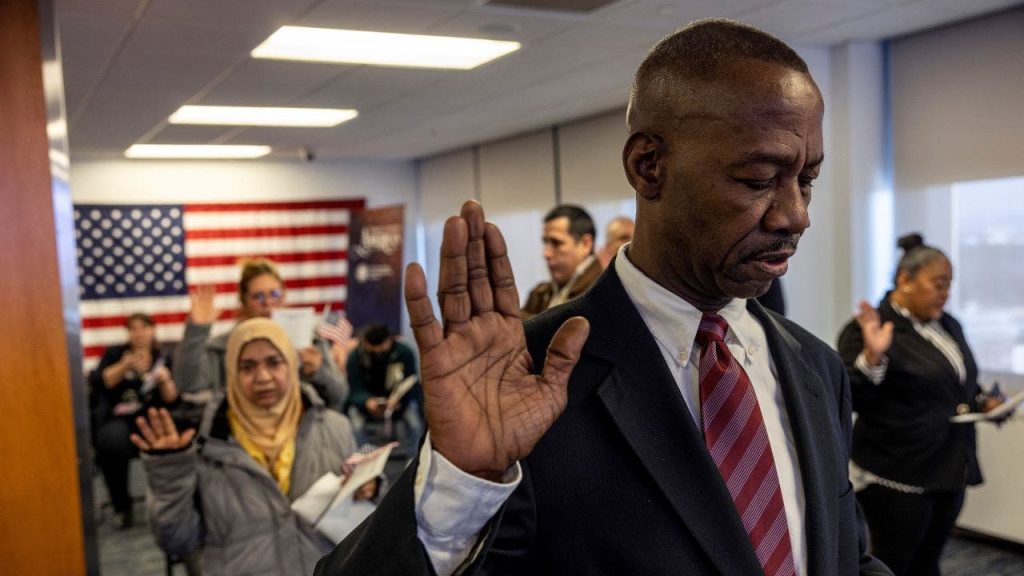The Department of Homeland Security (DHS) has made a significant policy shift regarding naturalization ceremonies, indicating that it will refuse to participate in such events hosted by localities with sanctuary policies. These policies typically restrict local law enforcement from cooperating with federal immigration enforcement. The decision was communicated through a memo from leadership at U.S. Citizenship & Immigration Services (USCIS) and will affect various cities across the nation, including areas that have prominently adopted these policies. The agency clarified that the change would not impact an individual’s ability to become a U.S. citizen but aims to reaffirm the significance of the rule of law.
| Article Subheadings |
|---|
| 1) Overview of the New Naturalization Policy |
| 2) Impact on Localities with Sanctuary Policies |
| 3) Statement from DHS Officials |
| 4) Ongoing Trends in Immigration Enforcement |
| 5) Community Reactions and Future Implications |
Overview of the New Naturalization Policy
As of a recent directive from the DHS, U.S. Citizenship & Immigration Services (USCIS) will no longer take part in naturalization ceremonies held in localities identified as “sanctuary cities.” Sanctuary cities are municipalities that have adopted laws or policies designed to protect undocumented immigrants from deportation. The move signifies a departure from previous practices where local government venues often hosted naturalization ceremonies. Under the new policy, USCIS will conduct these ceremonies at federally owned locations or private venues instead, effectively circumventing the involvement of local governments that do not comply with federal immigration requests.
Impact on Localities with Sanctuary Policies
The directive specifically impacts cities like Los Angeles, where traditional public venues such as libraries, museums, or schools might have been considered for conducting naturalization ceremonies. If any local governmental body in a sanctuary city attempts to host a naturalization event, the agency is advised to turn down the request politely. This measure essentially means that these localities will miss out on hosting what is not only a legally significant event but also an important community gathering, thus impacting the outreach and accessibility of citizenship ceremonies amidst diverse immigrant populations.
Statement from DHS Officials
A senior official from the DHS expressed that the enforcement of sanctuary policies is harmful to public safety and also undermines the constitution. This opinion highlights a growing friction between local laws designed to protect undocumented immigrants and federal immigration enforcement efforts. As quoted from the official,
“Sanctuary policies are an insult to our Constitution, they endanger all levels of law enforcement, and they leave law-abiding American citizens around the country at the mercy of violent and dangerous criminal aliens.”
The spokesperson stressed that the federal government remains committed to respecting legal immigration and citizenship pathways but asserts that these should occur in environments where local law is upheld.
Ongoing Trends in Immigration Enforcement
This policy shift reflects ongoing trends in the U.S. immigration enforcement landscape, particularly following previous administrations that have taken a stronger stance against sanctuary jurisdictions. The current approach echoes challenges posed by U.S. Immigration and Customs Enforcement (ICE), which relies heavily on local law enforcement cooperation to apprehend undocumented immigrants, especially those suspected of other criminal activities. Tensions have escalated as some local authorities refuse to cooperate with federal requests to detain undocumented individuals facing deportation. In response, federal authorities have threatened to cut federal funding for enforcement in cities that refuse to comply with immigration laws.
Community Reactions and Future Implications
The response to this new policy has been mixed among community members, local officials, and immigrant advocates. Critics argue that this approach will disenfranchise communities and create barriers for immigrants seeking citizenship. In contrast, supporters from some law enforcement backgrounds claim that adherence to federal immigration policies will foster a safer environment for all citizens, including undocumented individuals who tend not to report crimes for fear of being apprehended. The potential fallout for communities that host fewer naturalization ceremonies could have long-term effects on public engagement, social cohesion, and the overall immigrant experience in those areas.
| No. | Key Points |
|---|---|
| 1 | DHS will no longer let localities with sanctuary policies host naturalization ceremonies. |
| 2 | USCIS will conduct ceremonies at federally controlled locations or private venues. |
| 3 | Critics believe this could disenfranchise communities and limit access to citizenship. |
| 4 | DHS officials say sanctuary policies compromise public safety and legal authority. |
| 5 | Current immigration policy represents a broader trend against sanctuary jurisdictions. |
Summary
The recent decision by the Department of Homeland Security to exclude sanctuary cities from participating in naturalization ceremonies marks a critical juncture in U.S. immigration policy. This move has provoked considerable debate regarding public safety, legal authority, and the accessibility of citizenship for immigrants. As the nation continues to grapple with immigration-related topics, this shift may have lasting implications on local law enforcement and community dynamics.
Frequently Asked Questions
Question: What is the significance of naturalization ceremonies?
Naturalization ceremonies are essential as they represent the final step in the process for immigrants to become U.S. citizens, culminating in the Oath of Allegiance.
Question: How do sanctuary policies affect local law enforcement?
Sanctuary policies can create tensions between local law enforcement and federal immigration agencies, often leading to non-cooperation that challenges federal enforcement actions.
Question: What will happen to individuals seeking citizenship in sanctuary areas?
Individuals in sanctuary areas will still be able to pursue citizenship, but the new policy limits the public venues available for their naturalization ceremonies.


